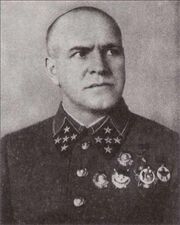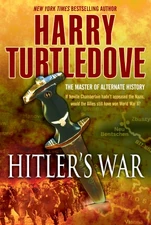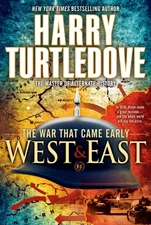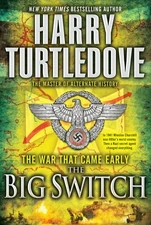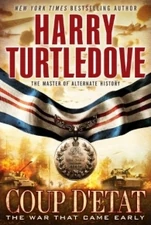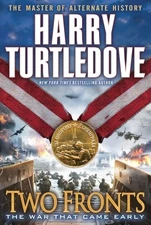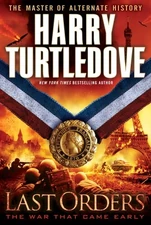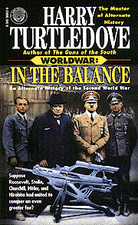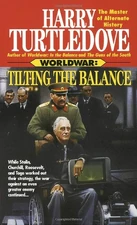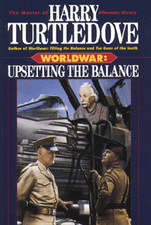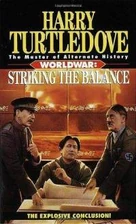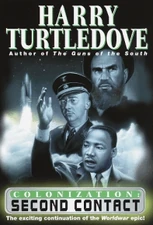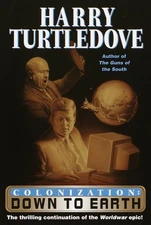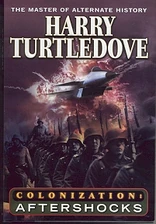| ||||||||||||||||||||||||||||||||||||||||||||||||||||||||||||
Georgy Konstantinovich Zhukov (Георгий Константинович Жýков, 1 December 1896 – 18 June 1974) was a Soviet military commander who led the Red Army to liberate the Soviet Union from Axis occupation, to advance through much of Eastern Europe, and to conquer Germany's capital, Berlin. He is one of the most decorated heroes in the history of both Russia and the Soviet Union.
Note on spelling
The Russian name Геoргий can be transliterated as either Georgi or Georgy. Both spellings have been used by Harry Turtledove in different stories.
Georgy Zhukov in The Man With the Iron Heart
Georgy Zhukov (1896-1945) was a long-time rival of Ivan Koniev. As Zhukov was Joseph Stalin's favorite, he was given the privilege of taking Berlin, a fact that nettled Koniev up until a few minutes before his death in May 1945.[1]
Zhukov was killed when members of the German Freedom Front poisoned liquor at with wood alcohol at the New Years' Eve celebration on 31 December 1945.[2]
Georgy Zhukov in Worldwar
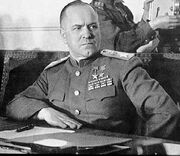
When the Race's Conquest Fleet arrived in 1942, Marshal Georgy Zhukov was initially forced to make huge concessions of Soviet territory to the unexpected and far more advanced enemy. However, Zhukov pioneered innovative tactics which overcame the Race's technological superiority through the use of superior Soviet numbers (at tremendously high cost to his army) and increasingly short supply reserves for the Race (this probably saved Zhukov from Joseph Stalin's wrath). Zhukov turned the tide, stabilized the front, and began retaking territory from the Race, especially after the Soviet Union deployed an atomic bomb near Kaluga.[3]
After the war Zhukov remained Marshal of the Red Army. Following the death of Stalin, he became, along with Lavrenti Beria of the NKVD and Foreign Commissar Andrei Gromyko, one of General Secretary Vyacheslav Molotov's most important advisers.[4] Molotov trusted neither Zhukov nor Beria and attempted to play them off against each other; the two had a deep-seated rivalry between them.[5]However, in 1963, Beria and the NKVD attempted a coup against Molotov, and Zhukov suppressed it.[6] He had a choice between restoring Molotov and making himself General Secretary. He chose to restore Molotov, but Molotov no longer had a counterbalance against him, and Zhukov felt at liberty to use the veiled threat of launching his own coup to influence Molotov's policy decisions. Ultimately, he continued to respect Molotov's authority for the remainder of his career.[7][8]
In 1966, Zhukov found a new obsession in the form of a Canadian-American invention called the Furry.[9]
Georgy Zhukov in "The Last Article"
After years of fighting, Georgy Zhukov (1896-1946) conceded defeat to German forces led by Field Marshal Walther Model in 1946 outside Kuibishev. Model allowed Zhukov a few last words to his troops before he had him shot.[10]
Georgy Zhukov in The War That Came Early
By 1940, Georgy Zhukov was one of the only generals who was named specifically in Radio Moscow reports, suggesting he was successful against the "Hitlerites".[11]
Georgy Zhukov in "The Phantom Tolbukhin"
Georgy Zhukov (1896-1937 or 1938) was one of several generals who were purged by Joseph Stalin between 1936 and 1938. In 1947, years after the Soviet Union had fallen to Germany, guerrilla leader Fedor Tolbukhin reflected on those purges, and realized they had virtually assured his country's defeat.[12]
See Also
Marshal Rathar, a fictional general in the Darkness series who seems to be broadly inspired by Zhukov.
References
- ↑ The Man With the Iron Heart, pg. 21, TPB.
- ↑ Ibid., pg. .
- ↑ Tilting the Balance, pg. 482-485, mmp.
- ↑ Second Contact, pg. 176, mmp.
- ↑ Ibid., pg. 177, 354-357.
- ↑ Ibid., pg. 449-454.
- ↑ Ibid., pg. 519-523.
- ↑ Down to Earth, generally.
- ↑ Aftershocks, pgs. 598-601, mmp.
- ↑ See., e.g., The Best Military Science Fiction of the Twentieth Century, pg. 232.
- ↑ The Big Switch, pg. 296, HC.
- ↑ Alternate Generals, pg. 123; Counting Up, Counting Down, pg. 112, TPB.
| Military offices (OTL) | ||
|---|---|---|
| Preceded by Kirill Meretskov |
Chief of the Staff of the Red Army 1941 |
Succeeded by Boris Shaposhnikov |
| Political offices (OTL) | ||
| Preceded by Nikolai Bulganin |
Minister of Defense of Soviet Union 1955–1957 |
Succeeded by Rodion Malinovsky |
| ||||||||||||||
| |||||||||||||||||
| |||||||||||
| ||||||||||||||||||||||
| |||||||||||||||||||||||||
